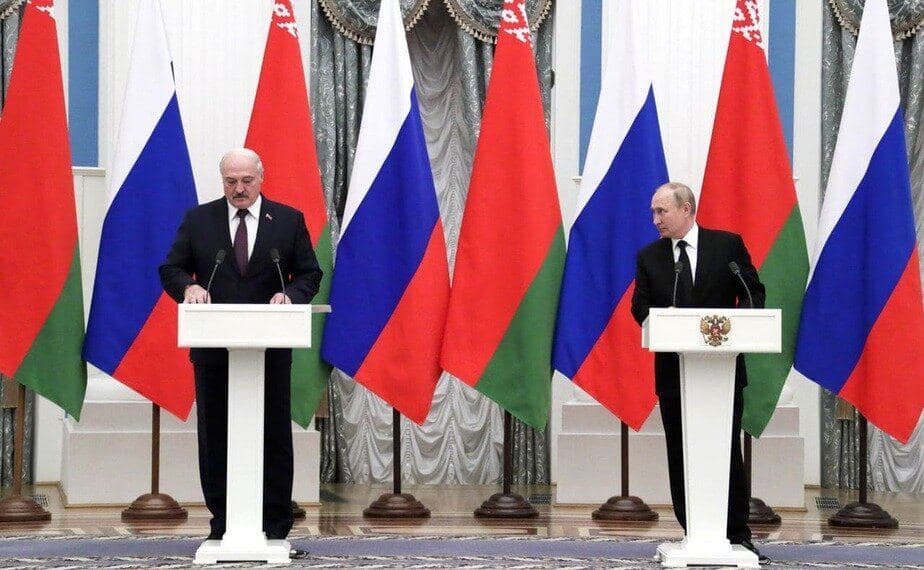1+1: Controversial issues? “We’ll think about them tomorrow”
 The situation has not changed
The situation has not changed

On September 9th, another round of Belarusian-Russian integration negotiations was held, which some observers characterise as the “sale of [Belarusian] sovereignty”. So far, Lukashenka has managed not to sell anything, and Putin not to buy. All controversial and “sensitive” integration issues were excluded in advance, allowing officials of both sides to characterise the meeting as “productive” and “breakthrough”.
Putin and his integration partner Lukashenka approved the signing of 28 “union programmes” (formerly “road maps”) related to the convergence of macroeconomic policy, harmonisation of tax and customs legislation, etc. (the final list is published on the website of the Government of the Russian Federation). Ratification of these measures is promised by the end of this year. If all 28 positions were implemented, it would amount to implementing the Treaty on the Creation of the Union State of 1999. Overall, the results of the meeting were:
1. The announcement of an agreement on the unification of the gas market between Russia and Belarus, scheduled to be signed by December 1st, 2023, appears very promising if one disregards the long history of disputes around this issue. The agreement between Lukashenka and Putin is somewhat vague; it is not known how long the integration enthusiasm of Moscow and Minsk will last (more than two years?), and the exact terms of such a “merger” of gas markets are not clear. There are also plans to create a single market for oil and electricity, though western sanctions are a significant complicating factor. The good news is that next year Belarus will buy gas at the current price (USD 128.5 per thousand cubic meters). This announcement was accompanied by victorious reports, although no one talked about the upcoming increase in gas prices.
2. Credit resources provided to the Belarusian side from September 2021 to the end of 2022 will be capped at roughly 630 million dollars, which is unpleasant news for Minsk. Previously, Minsk initiated negotiations to secure USD 3 billion through the Eurasian Fund for Stabilization and Development. On September 8th, Russian Finance Minister Anton Siluanov noted that “we will be able to provide some types of support if necessary”, indicating that Minsk cannot expect full backing for its request. RBC notes that Belarus’s current EFSD credit limit is about USD1.98 billion, and it has been wholly utilised.
3. The rhetoric regarding a common defence space and mutual protection against external threats is nothing new, given that a “single defence centre” already exists and joint exercises are being held. A year ago, Lukashenka proposed increasing troop numbers, but Putin regarded current allocations as sufficient. However, the perennial issue of a Russian military base on Belarusian territory has returned to the agenda and influences the question. As commentators note, there are no specifics regarding such a base in the documents. There is a lengthy formulation about military assistance, but the structure of the “single weapons field” already operates within the framework of the CSTO.
4. Creating a common payment space and integrating currencies is merely a statement of intent as the negotiators admit that they are not ready for such a transition. There is no question of switching to a single currency in principle.
5. Many other agreements concerning harmonisation of the indirect aspects of the tax system, equal rights and opportunities for citizens of Russia and Belarus in the economic and social spheres within the framework of the Union State, a single industrial policy and, unrestricted access to public procurement etc., appear equally speculative.
Overall, analysts report that all “harmonisations” involve secondary issues, leaving out the primary points of contention. For example, it is difficult to see how a significant part of the 28 initiatives, including the single socio-economic model, can be implemented since the legal status is unclear, and there are no supranational institutions to oversee implementation.
Subscribe to our newsletter




Situation in Belarus
Constitutional referendum: main consequences


 Video
Video
How to count the political prisoners: are the new criteria needed?


 Video
Video
Paternalism In Decline, Belarusian Euroscepticism, And The Influence Of Russia


 Video
Video












